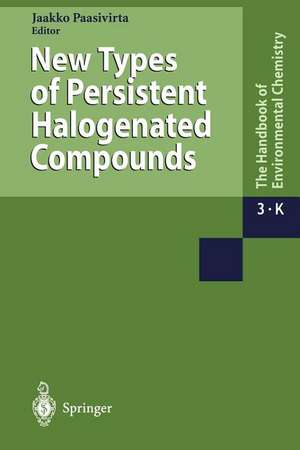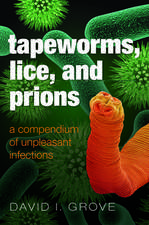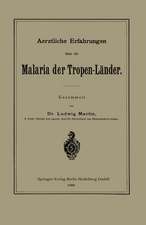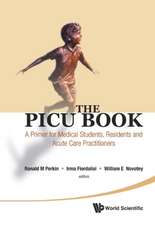New Types of Persistent Halogenated Compounds: The Handbook of Environmental Chemistry, cartea 3 / 3K
Editat de Jaakko Paasivirtaen Limba Engleză Paperback – 10 oct 2011
| Toate formatele și edițiile | Preț | Express |
|---|---|---|
| Paperback (1) | 1414.43 lei 6-8 săpt. | |
| Springer Berlin, Heidelberg – 10 oct 2011 | 1414.43 lei 6-8 săpt. | |
| Hardback (1) | 1421.76 lei 6-8 săpt. | |
| Springer Berlin, Heidelberg – 12 noi 1999 | 1421.76 lei 6-8 săpt. |
Din seria The Handbook of Environmental Chemistry
- 18%
 Preț: 1819.46 lei
Preț: 1819.46 lei - 18%
 Preț: 1827.32 lei
Preț: 1827.32 lei - 18%
 Preț: 2102.76 lei
Preț: 2102.76 lei - 18%
 Preț: 2089.35 lei
Preț: 2089.35 lei - 18%
 Preț: 2481.57 lei
Preț: 2481.57 lei -
 Preț: 1465.22 lei
Preț: 1465.22 lei - 18%
 Preț: 1223.43 lei
Preț: 1223.43 lei - 5%
 Preț: 1419.56 lei
Preț: 1419.56 lei - 15%
 Preț: 639.41 lei
Preț: 639.41 lei -
 Preț: 392.97 lei
Preț: 392.97 lei - 5%
 Preț: 366.56 lei
Preț: 366.56 lei - 18%
 Preț: 1826.69 lei
Preț: 1826.69 lei - 15%
 Preț: 640.71 lei
Preț: 640.71 lei - 18%
 Preț: 728.91 lei
Preț: 728.91 lei - 5%
 Preț: 1424.89 lei
Preț: 1424.89 lei - 18%
 Preț: 1225.94 lei
Preț: 1225.94 lei -
 Preț: 386.00 lei
Preț: 386.00 lei - 18%
 Preț: 732.70 lei
Preț: 732.70 lei - 15%
 Preț: 641.53 lei
Preț: 641.53 lei - 5%
 Preț: 1416.81 lei
Preț: 1416.81 lei - 15%
 Preț: 644.82 lei
Preț: 644.82 lei -
 Preț: 386.39 lei
Preț: 386.39 lei -
 Preț: 389.49 lei
Preț: 389.49 lei - 5%
 Preț: 719.02 lei
Preț: 719.02 lei - 5%
 Preț: 714.63 lei
Preț: 714.63 lei - 18%
 Preț: 1215.22 lei
Preț: 1215.22 lei -
 Preț: 392.97 lei
Preț: 392.97 lei - 18%
 Preț: 1832.08 lei
Preț: 1832.08 lei - 15%
 Preț: 639.73 lei
Preț: 639.73 lei - 5%
 Preț: 1925.56 lei
Preț: 1925.56 lei -
 Preț: 381.98 lei
Preț: 381.98 lei - 5%
 Preț: 363.97 lei
Preț: 363.97 lei -
 Preț: 386.00 lei
Preț: 386.00 lei - 5%
 Preț: 1423.39 lei
Preț: 1423.39 lei - 15%
 Preț: 643.16 lei
Preț: 643.16 lei -
 Preț: 383.12 lei
Preț: 383.12 lei - 15%
 Preț: 642.51 lei
Preț: 642.51 lei - 5%
 Preț: 716.09 lei
Preț: 716.09 lei - 5%
 Preț: 1407.87 lei
Preț: 1407.87 lei - 18%
 Preț: 1231.01 lei
Preț: 1231.01 lei
Preț: 1414.43 lei
Preț vechi: 1488.88 lei
-5% Nou
Puncte Express: 2122
Preț estimativ în valută:
270.78€ • 282.53$ • 226.98£
270.78€ • 282.53$ • 226.98£
Carte tipărită la comandă
Livrare economică 12-26 martie
Preluare comenzi: 021 569.72.76
Specificații
ISBN-13: 9783642085123
ISBN-10: 3642085121
Pagini: 384
Ilustrații: XIV, 366 p.
Dimensiuni: 155 x 235 x 20 mm
Greutate: 0.54 kg
Ediția:Softcover reprint of the original 1st ed. 2000
Editura: Springer Berlin, Heidelberg
Colecția Springer
Seriile The Handbook of Environmental Chemistry, Anthropogenic Compounds
Locul publicării:Berlin, Heidelberg, Germany
ISBN-10: 3642085121
Pagini: 384
Ilustrații: XIV, 366 p.
Dimensiuni: 155 x 235 x 20 mm
Greutate: 0.54 kg
Ediția:Softcover reprint of the original 1st ed. 2000
Editura: Springer Berlin, Heidelberg
Colecția Springer
Seriile The Handbook of Environmental Chemistry, Anthropogenic Compounds
Locul publicării:Berlin, Heidelberg, Germany
Public țintă
ResearchCuprins
Alkylaromatic Chlorohydrocarbons.- Tris(4-Chlorophenyl)Methanol and Tris(4-Chlorophenyl)Methane.- Polychlorinated Terphenyls.- Polybrominated Biphenyls and Diphenylethers.- Polychlorinated Naphthalenes (PCNs).- Non- and Mono-ortho Chlorinated Biphenyls.- Polychlorinated Diphenyl Ethers (PCDE).- Chlorinated Paraffins.- Toxaphene. Analysis and Environmental Fate of Congeners.- Polychlorinated Dibenzothiophenes (PCDTs), Thianthrenes (PCTAs) and Their Alkylated Derivatives.- Methyl Sulfone and Hydroxylated Metabolites of Polychlorinated Biphenyls.
Textul de pe ultima copertă
The book gives an overview on properties and research methods of new persistent organic chlorine and bromine compounds which have been observed as potential environmental hazards especially as bioaccumulated xenobiotics, but intensively studied only recently. Sources from product uses, industrial processes, wastes, emissions or metabolic transformations are reviewed. Physical and chemical properties and degradation rates useful for environmental fate predictions are given. Observations of levels and trends in environmental compartments are presented. Analytical methodologies and biological effects are described in detail. Compounds reviewed include planar PCBs, PCB metabolites, alkylaromatic chlorohydrocarbons (from pulp chlorobleaching and substitutes of PCBs), polybrominated biphenyls, polychlorinated and polybrominated diphenyl ethers, polychlorinated terphenyls, naphthalenes, dibenzothiophenes and paraffins, toxaphene and tris(4-chlorophenyl)methane derivatives.
Caracteristici
Comprehensive and state-of-the-art overview on environmentally hazardous compounds, the toxicological properties and metabolic transformations of which have been studied only recently








